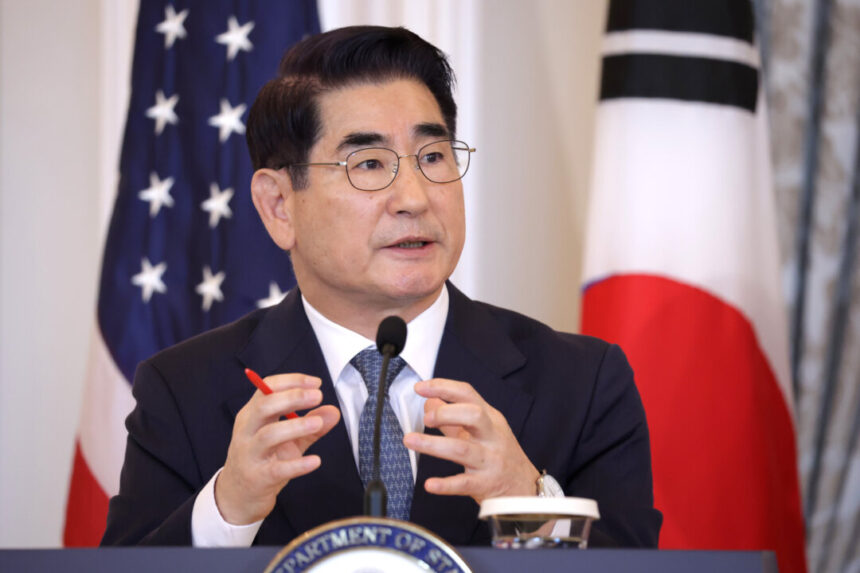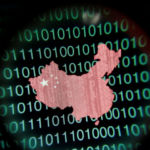The former defense minister voluntarily appeared for questioning at the Seoul Central District Prosecutors’ Office.
South Korea’s former defense minister, who resigned this week over his role in the president’s martial law declaration, has been arrested.
Former Defense Minister Kim Yong-hyun was reported to have willingly presented himself for questioning at the Seoul Central District Prosecutors’ Office at 1:30 a.m. on Dec. 8, according to local media reports.
Police have reported that 120 personnel are actively investigating numerous complaints against South Korean President Yoon Suk Yeol, 63, and his aides for alleged abuse of power related to the decree announced by Yoon on Dec. 3. A special investigation unit was established on Dec. 6 by the prosecutor’s office to handle these cases.
Upon his arrival at the unit’s headquarters, Kim had his phone confiscated and was subsequently arrested on charges including insurrection, abuse of authority, and obstruction of others from exercising their rights, as per media reports.
Kim was part of a group of advisors who advised Yoon to declare martial law on Dec. 3 at 9 p.m. local time. He was also involved in the decision to deploy armed martial law troops to the National Assembly.
Anti-State Forces
Yoon, in announcing his rare action, said he decided on the emergency measure to combat “anti-state forces” within South Korea.
“The lives of the people are of no concern, and state affairs are in a paralyzed state solely due to impeachments, special prosecutors, and the opposition party leader’s shield [against prosecution],” Yoon said of their actions within South Korea’s unicameral government.
He added that the anti-state forces were “trampling on the constitutional order” by acting as a dictatorship, working to paralyze the government’s budget “as a tool for political agitation” and pushing to impeach 22 government officials, including prosecutors.
“Attempts to impeach the minister of national defense are paralyzing the executive branch as well,” he said.
The pro-U.S. agenda of the Yoon administration has sought a stronger stance against appeasing North Korea as well as the Chinese communist regime, which is enjoying expanded influence in South Korean politics after years of efforts to expand its soft power in the country.
Yoon lifted the six-hour-old martial law decree early Dec. 4 shortly after 190 opposition lawmakers gathered at Parliament in the early hours to unanimously vote against it. Opposition parties hold 192 seats in South Korea’s 300-seat National Assembly, with Yoon’s right-leaning People Power Party (PPP) holding the remaining 108 seats.
The main opposition party, the Democratic Party of Korea (DPK), holds a majority of 170 seats, smaller parties hold 21 seats, and Speaker Woo Won-shik, who was affiliated with the DPK before his speakership, holds the remaining seat.

South Korea’s main opposition Democratic Party (DP) leader Lee Jae-myung leaves the Seoul Central District Court in Seoul, South Korea, on Nov. 15, 2024. Chung Sung-Jun/Getty Images
The head of the DPK, Lee Jae-myung, 60, narrowly lost the presidential election to Yoon in 2022. Lee is facing a suspended one-year prison sentence on charges of making false claims about development projects during his presidential campaign. He has denied the charges and said he will appeal.
He is also facing other criminal charges that he claims are politically motivated, including allegations that he pressured a local businessman to send $8 million in illegal payments to North Korea during his time as Gyeonggi governor as he tried to set up a visit that never materialized.
Crisis of Governance Continues
All of Yoon’s cabinet members offered to resign over the unpopular emergency action on Dec. 4. Yoon only accepted Defense Minister Kim’s resignation on Dec. 5, who he replaced with Choi Byung Hyuk, a retired four-star general who was serving as South Korea’s ambassador to Saudi Arabia.
He said he accepts accountability for his actions, and pledged to never again invoke martial law but did not resign, instead handing power over to his party to navigate the path forward.
“As for the stability of state affairs, including my remaining term, I will leave it to my party. Moving forward, the party and the government will jointly take responsibility for managing state affairs,” he said. “Once again, I bow my head and apologize for causing concern to the citizens.”
How the PPP will choose to proceed remains to be seen, as ongoing political infighting between various factions within the party continues to intensify.
The budget process has been delayed due to various impeachment actions by the opposition, including efforts to impeach prosecutors involved in a case concerning alleged stock manipulation related to First Lady Kim Keon Hee. Finance Minister Choi Sang-mok expressed concerns that these disruptions could affect the government’s support plans for people’s livelihoods and struggling regional economies.
Despite surviving an impeachment attempt, Yoon’s position remains precarious as the opposition vows to continue its efforts to impeach him. Main opposition leader Lee Jae-myung stated that they would persist in their attempts to pass the impeachment motion. Former Prime Minister Hwang Kyo-ahn criticized the National Assembly for becoming a “dictatorship of the opposition party” and supported Yoon’s actions as necessary to counter a perceived pro-North Korean left-wing influence.
If a successful impeachment were to occur, it would need to be reviewed by South Korea’s Constitutional Court for validity. This could trigger a new election within 60 days. Yoon, a former chief prosecutor, led the investigation that resulted in the impeachment of former President Park Geun-hye in 2016.
The last time martial law was declared in South Korea was in 1979, following the assassination of President Park Chung-hee. Democracy was restored in 1988 after a period of military rule. Yoon’s popularity has plummeted to a record low of 13 percent after the failed martial law decree, leading to economic uncertainty and a decline in the value of the South Korean won.
This article was contributed to by Katabella Roberts, Ryan Morgan, and The Associated Press. Can you please rewrite this sentence?
Source link







